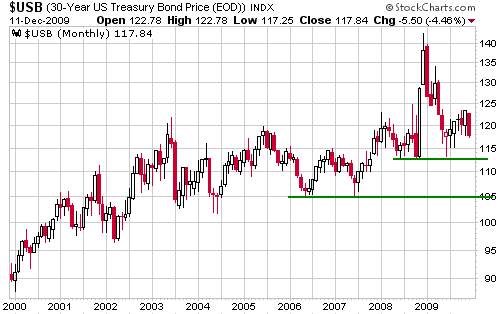Recognition of the US Inflation Problem
Steve Saville
email: sas888_hk@yahoo.com
Dec 15, 2009
Below is an excerpt from a commentary originally posted at www.speculative-investor.com on 13th December 2009.
When the banking system (the central bank and the commercial banks) creates so much new money out of nothing that the total supply of money rises rapidly, it can be likened to counterfeiting on a grand scale. This counterfeiting distorts price signals, brings about the undeserved transfer of wealth to the first receivers of the new money, and depletes real savings. It therefore damages the economy. There are times when the economy is in good enough shape -- due to an existing large pool of real savings -- that the total amount of wealth is able to grow despite the hindrance of monetary inflation, but there are other times -- now, for example -- when earlier inflation and other central-bank/government-imposed distortions have already weakened the economy to such an extent that adding more inflation into the mix causes an irresistible drag.
The US currently has an inflation problem, meaning that there has been enough growth in the money supply to do substantial damage to the US economy. The crisis of 2007-2009 is evidence of this damage in that it was a natural and inevitable consequence of the preceding inflation-fueled boom. And yet, US officialdom is attempting to overcome the inevitable adverse consequences of monetary inflation by creating even more money out of nothing. The inflation problem is therefore set to become even more troublesome over the years ahead.
Under the current (post-1971) monetary system, one of the manifestations of an inflation problem is a rise in the price of gold relative to almost all other prices. That's what occurred during the 1970s and also what has occurred since 2001. We think it works this way because economic weakness combined with the gradual realisation that governments and their central banks are not acting like good stewards of the official currency leads to an increase in the desire to save in terms of something other than the official currency. Note that there was plenty of monetary inflation during 1980-2000, but throughout much of this period the underlying structure of the economy was sound enough (the pool of real savings was large enough) to enable real growth to occur in spite of the inflation.
Unfortunately, an inflation problem will never be perceived as such by the average person, the average economist or the average central banker until the so-called "general price level" begins to rise by more than about 3% per year, even though a rise in the general price level is the most TRIVIAL effect of inflation. If monetary inflation did nothing other than shift all prices upward in unison then it would never be a big problem.
To put it another way: an inflation problem exists today, but the point of widespread recognition will only come after the effects spread to the "general price level". As discussed in the latest Interim Update, we think this will happen during 2010. Apart from ensuring that gold remains in a major upward trend relative to almost everything, this should set the scene for a secular decline in the Treasury Bond market.
Interestingly, the monthly chart of the T-Bond displayed below is consistent with the idea that the inflation problem will become more widely recognised over the years ahead. In particular, we appear to have the makings of a multi-year head-and-shoulders topping pattern, with the left shoulder, the head, and part of the right shoulder now in place.

We want to stress that the widespread recognition of the inflation problem represents a far greater threat to the bond market than the huge increase in bond supply that's set to occur. As the Japan experience proved, a relentlessly weak economy combined with minimal monetary inflation can lead to almost insatiable demand for government bonds. One of the critical differences between Japan and the US is that the US has added massive monetary inflation to the mix.
Steve Saville
 email: sas888_hk@yahoo.com email: sas888_hk@yahoo.com
Hong Kong Regular financial market forecasts and analyses are provided at our web site:
http://www.speculative-investor.com/new/index.html. We aren't offering a free trial subscription at this time, but free samples of our work (excerpts from our regular commentaries) can be viewed at: http://tsi-blog.com
Copyright ©2002-2019 speculative-investor.com All Rights Reserved. Saville Archives
321gold Ltd

|

